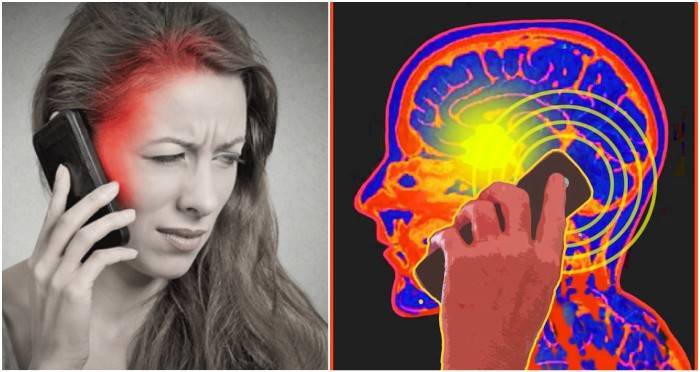
Concerns that cell phones might cause brain tumors have made headlines in recent months, sparked by speculations about Senator Ted Kennedy’s malignant glioma. Other health problems attributed to cell phone use include salivary tumors, eye cancer and infertility due to lower sperm counts. Cell phones are also suspected to be responsible for an increased incidence of autism, ADHD, and other behavioral problems in children born to mothers who used them as little as two or three times a day during pregnancy. Children are at significantly increased risk because their brains are developing and their thinner skulls allow cell phone microwave emissions to penetrate deeper into the brain. They absorb twice as much energy as adults and a two-minute call can alter brain function in a child for an hour. One study found that behavioral problems were 80 percent higher in those who used cell phones by age 7.
Older individuals also experience emotional stress from cell phone use that is often not appreciated because it is more insidious. As previously noted, a study of over 1300 people who regularly used cell phones found that they “experienced an increase in psychological distress and a decrease in family satisfaction” due to the intrusion of frequent work related calls that disrupted life at home or while on vacation. A new study in healthy Swedish teenagers reported that those who made more than 15 calls and/or sent 15 text messages a day suffered from increased restlessness, difficulty in falling asleep or waking up frequently, and were more fatigued compared to a control group making less than five calls or text messages. They also consumed more stimulating beverages and only one-third ate breakfast in contrast to most of the controls. In a recent Korean study that divided over 500 teens into four groups depending on cell phone use, those in the top tier scored 50% higher on a depression rating scale than those with the least use. Many teenagers become addicted to their cell phones and suffer withdrawal symptoms if they are not immediately available. Some even keep them under their pillows at night to receive and send text messages, which interferes with sleep.
Companies that claim to block or neutralize cell phone radiation damage are promoting bogus products to profit from the public’s justifiable concerns. They also take advantage of the general lack of ignorance about mechanisms of action by citing scientific studies that are irrelevant or by using confusing but impressive terms. For example, a 7/28/08 newspaper article quoted the CEO of Biopro technology in South Africa as follows; “BIOPRO cell chips combine the benefits of BIOPRO’s patented noise field nano-technology Molecular Resonance Effect Technology (MRET), and BIOPRO’ s propriety subtle energy technology Energy Resonance Technology (ERT) . . . . I am worried about the future of peoples’ wellness and how a newly recognized, yet rapidly emerging toxin called electropollution may be silently accelerating the aging process. It is dangerously increasing stress levels, preventing essential nutrients from entering the body’s cell, as well as keeping damaging toxins from exiting them. BIOPRO Technology is breaking new grounds, with the introduction of BIOPRO Cell Chips, Universal Chips, home harmoniser and Water appliances that will reduce the dangers from electromagnetic radiation emitted by cell phones, PDAs, Bluetooth handsets and other home appliances.”

Electromagnetic radiation can only be blocked by dense materials like lead. The BIOPRO Cell Chips are merely plastic stickers costing a few cents and more than one is required for different devices. However, these are touted as being “the flexible resin mylar composite cell chip powered by BIOPRO’s Proprietary Energy Resonance Technology (ERT ™) ” that allegedly will “harmonize” all electromagnetic fields. Yet, they include the standard disclaimer that “These statements have not been evaluated by the FDA. The products and/or technologies listed are not intended to diagnose, treat, cure, or prevent any disease.” Biopro is a multilevel marketing scam with a history of promoting similar worthless products like their QX-3 Econo Fuel Saver chip to increase engine power and mileage while reducing emissions. The FTC (Federal Trade Commission) has already fined 2 U.S. companies for claiming their “chips” could block 99% of cell and mobile phone radiation but it is not clear if their jurisdiction extends to Biopro’s Canadian and other foreign divisions that sell products over the Internet, so Caveat emptor!
References:
Cell Phones Injurious to Health, Chinyere Okoy, This Day (African Views on Global Health) 7/28/08, Paper presented at U.S. Associated Professional Sleep Societies annual meeting June, 2008 by Gaby Badre, Gothenburg, Sweden
Kim Dong-hyun Cell Phones and Mental Health Korean Journal of Epidemiology, March. 2005
Chesley, N. Journal of Marriage and Family 2005; 67:1237-1248.
Are Cell Phones Increasing Stress Levels?
One might think that cell phones would reduce stress by facilitating contacting someone in an emergency or transmitting time urgent information but a recent study suggests otherwise. A sociology professor who followed more than 1300 people found that those who regularly used cell phones or pagers “experienced an increase in psychological distress and a decrease in family satisfaction” compared to those who used these devices less often. No such effects were seen in others who regularly used e-mails.
The study also looked at “spillover” — the seepage of work concerns into home life, and vice versa. For both men and women, “cell phone and pager use allows negative job concerns to infiltrate another part of life,” and women got a “double-whammy,” reporting home concerns that spilled over into work. It’s dangerous to draw conclusions for everyone based on one study, but it does seem that cell phones and pagers are somehow increasing psychological stress and decreasing family satisfaction for many.
One reason may be that although cell phones may make people more accessible wherever they are, this may not be desirable for unwanted calls when you are on vacation or busy at work. In addition, as use of cell phones and pagers becomes increasingly prevalent, the line between family and work life can continue to blur. The professor suggests that consumers might want to consider whether technology use is “making your family better, even if it’s stressing you out . . . . Then, maybe it’s OK. Or maybe you should take stock: How much of this information that I’m getting from this technology is making my life easier? If the answer is, ‘Not a lot,’ maybe it’s time to shut things down.”
Reference: Chesley, N. Journal of Marriage and Family 2005; 67:1237-1248.
